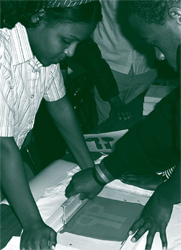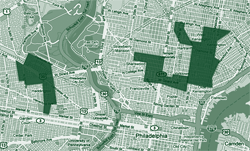May 2009
In this Issue
Local Partnerships Promote Long-Term Prosperity
Storm Windows Can Make a Difference
Land Banks Help Stabilize Properties
The Status of America's Housing
In the next issue of ResearchWorks
Local Partnerships Promote Long-Term Prosperity
In 1994, HUD awarded the city of Philadelphia $79 million to invest in three disadvantaged neighborhoods designated as the Philadelphia Empowerment Zone. The investments were intended to bring about economic development, neighborhood change, and an improved quality of life. Because this federal support would last for only 10 years, the neighborhoods sought a way to use the funds to promote continued progress and sustainability.

The result was the Neighborhood Funding Stream (NFS), created in partnership with the city of Philadelphia and its community advisory boards (known as Community Trust Boards). Established in 2004, NFS began with $8.75 million in seed money generated by the revolving loan fund developed from the city's Empowerment Zone grant. United Way of Southeastern Pennsylvania manages the NFS and helps make the fund's investment decisions. United Way administers the grant program with assistance from NeighborhoodsNow, a Philadelphia-based nonprofit that uses market-driven programs to improve local neighborhoods, and receives direction from each of the three neighborhoods’ Community Trust Boards.
With loan repayments and the expert advice of Vanguard Asset Management Services, the original $8.75 million investment has grown to more than $14 million. Five percent of these funds are available for annual grants that support sustainable economic and community development. Since its inception, $1.75 million in grants has been awarded to more than 65 nonprofit organizations. Ultimately, the grants are expected to "grow money, foster unique projects, and build community expertise and influence," according to Katelyn Allen-Yoakum, director of the NFS.

Deciding how best to use this asset in light of competing needs within the community has been a challenge. To help prioritize these needs, the Community Trust Boards sought data from surveys and studies. For example, the American Street Empowerment Zone's board commissioned a survey of 400 households to look at critical community issues. They learned that many residents spent at least 30 percent of their income on housing. Although two-thirds of the respondents owned their homes, only 25 percent had homeowner's insurance to protect household assets from unforeseen emergencies. The board also learned that some areas within the neighborhood had recently experienced significant increases in residential sales prices. As a result, the board collaborated with the city of Philadelphia to underwrite revitalization efforts that would support increased access to housing-related services, information, and other resources within the community. Such efforts include stabilizing vacant land, offering tax incentives to businesses, and providing homeownership opportunities in the neighborhood.
Many grants have directly assisted residents of the neighborhoods. In 2006, the Campaign for Working Families provided free tax preparation services and helped qualifying residents of the North Central Empowerment Zone apply for the Earned Income Tax Credit (EITC). Participating families received nearly $465,000 in federal and state refunds and saved $47,000 in fees, penalties, and interest payments. After the current funding cycle, local families will have received more than $1 million in refunds and EITC benefits from these services.
Another family service-oriented nonprofit, PathWaysPA, helped 60 individuals search for jobs and learn to manage personal finances. Maternity Care Coalition received grants in two neighborhoods. One grant funded North Central’s MOMobile, which provided healthcare services to 90 pregnant or new mothers, along with other resources such as assistance in escaping domestic violence. The other grant funded mobile healthcare services for 244 low-income pregnant women and new mothers in and around the American Street neighborhood.
Recognizing that half of Philadelphia's youth do not graduate from high school, NFS has awarded grants to youth-oriented activities centering on education and training, arts and culture, and improving health. Because research also shows that connecting at-risk youth to caring adult mentors helps children succeed in school, Big Brothers Big Sisters received a grant to develop and maintain mentoring relationships between local youths and mentors from Temple University and local faith-based communities. The Cardinal Bevilacqua Community Center helped youth aged 13–20 develop leadership skills by planning a weeklong fitness and health-awareness clinic for neighborhood teens and young adults. In the end, 80 children received fitness training and 15 youths learned new leadership skills. Through the Village of Arts and Humanities program, 90 teenagers participated in art workshops and later sold their products through a teen-led entrepreneurial initiative.
The success of NFS — the first community endowment to be funded with Empowerment Zone funds — is strengthened by an effective working relationship among residents, community leaders, and local government. These established relationships will undoubtedly help the West Philadelphia Empowerment Zone neighborhood, which joined the NFS in 2006 and has begun funding projects, to mirror the achievements made in the American Street and North Central neighborhoods. Information on NFS can be found at www.uwsepa.org/nfs.

